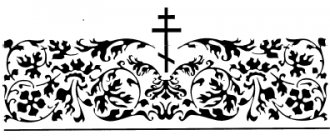How to pray correctly: 8 general tips, 5 rules for praying in church, 7 short prayers for every day, 5 appeals to God that every believer should know.
Prayer is the speech with which we address God. If our appeal is sincere and our faith is strong, then it is not so important whether we make some minor mistakes, which are often pointed out by particularly zealous old ladies in churches.
And yet, in matters of faith, as in any other, there are rules that must be followed. That is why it is advisable to learn how to pray correctly so that your words are heard by the recipient.
There won’t be much advice, but it’s better to stick to them so as not to run into judgment from others and not feel embarrassed for doing something wrong.
If God already wants good for people, why beg Him?
The question is what kind of good God wants for us. In order for us to find that eternal happiness for which we were created, it is not the things around us that must change, but ourselves. Without changing, we cannot become residents of heaven - in much the same way that a selfish person cannot become happy in marriage.
Only God can make these changes in us. But He created us as persons, not as things, and persons change by making decisions, by doing things that change the world around us, and, more importantly, ourselves. When we decide to acknowledge our dependence on God, to thank Him for His gifts, to ask forgiveness for our sins, we change—or rather, we give God the opportunity to change us.
How to pray correctly so that your prayer is not in vain?
Prayer cannot be in vain if your appeal to God is sincere and you think, first of all, about him, and not about yourself and your needs.
In addition to this rule, there are several more mandatory recommendations that should be followed, regardless of where you pray: in church or at home.
How to pray to God correctly in order to be heard?
People often confuse faith with business.
For some reason, it seems to them that turning to God is something like a commercial transaction: I came, donated to the temple, bought a candle and turned to You with a request. That's it - I've fulfilled my part of the deal, now it's your turn to give me what I ask for.
This is the main mistake!
The correct way to pray is to turn to God:
- putting aside pride;
- putting love for the Lord first, not self-love;
- thinking about the spiritual, not the material;
- with a request, not a demand;
- sincerely believing in Him, and not doubting: “Does He really exist?”
There are feelings that are right to address to God and those that should be avoided.
| With what feelings is it right to pray to God? | What feelings need to be put aside? |
| humility; | exaltation; |
| sincerity; | search for pleasure; |
| readiness to accept his will; | pride; |
| awe; | mistrust; |
| repentance. | boredom. |
At the same time, the church claims that during prayer you should not look for any special feelings or bring yourself to such an emotional state when hysteria begins.
Stay calm, clear your head of obscene thoughts and turn to God with sincere words - then He will hear you.
At the same time, it is important to accept His will and not impose your own. Simply put, you can ask, but you do not have the right to demand and complete the prayer with the firm conviction that your request must certainly be fulfilled.
Remember: “Thy will be done”!
2. Basic rules on how to pray correctly.
There are not many rules regarding prayers that believers should follow. It's all about the level of your humility before His will and the sincerity of your faith.
That is, the main thing is feelings, not details: where to stand, how to fold your hands, whether it is correct to kneel, etc.
Still, here are some tips for those who want to pray to God correctly:
- There is no need to limit yourself only to the church and icons. The more often you remember God during the day, the better. That is, you can pray anywhere.
- You should not artificially introduce yourself into a state of self-excitation and ecstasy. Prayer is humility and obedience, not a circus performance. It should give peace to the soul, and not drive you into a nervous state.
- If you are performing a full-fledged prayer, then you need to do it in front of the icon with your eyes open. This will allow you to fully concentrate on what you are doing.
- You should pray to the addressee. It could be: the Lord God, the Mother of God, the Holy Trinity, one of the Holy Great Martyrs. Special prayers have been developed for special episodes, for example, it is better to ask St. Panteleimon for recovery, etc.
- You cannot pray formally, that is, pronounce the right words with your lips, but be bored and think about something of your own. God is unlikely to hear such an appeal.
- It is wrong to wish oneself happiness at the expense of the misfortune of others. There are a number of requests that it is better not to ask God:
- Enrichment beyond all measure;
wishing sorrow and illness to your enemies;
- desire to take someone else’s husband away from the family, etc.
- It is correct not only to ask, but also to thank. For some reason, it is believed that everything good is the result of our labors and there is no need to thank God for it. But all sorts of misfortunes are His doing and you need to ask to remove them from your life. Maintain a reasonable balance between requests and thanks.
- Avoid meaninglessness. If you want to pray in your own words, then think a little about what exactly you want to ask God for. Confusion of thoughts and incoherent words will lead to the fact that the Lord may not hear you.
And in general, it is better not to ask for material things only if you are completely begging or have lost everything as a result of some accident.
3.Is it right to pray to God in your own words or are special prayers needed?
If you are a believer, then you must remember a number of obligatory prayers. These include:
1.Our Father.
Prayer
Our Father, who art in heaven! Hallowed be Thy name, Thy kingdom come, Thy will be done, as it is in heaven and on earth. Give us this day our daily bread; and forgive us our debts, just as we forgive our debtors; and do not lead us into temptation, but deliver us from the evil one.
TRANSLATION
Our Father who art in heaven! Hallowed be Thy name; Thy kingdom come; Thy will be done on earth as it is in heaven; Give us this day our daily bread; and forgive us our debts, as we forgive our debtors; and lead us not into temptation, but deliver us from evil.
2. To the King of Heaven.
Prayer
Heavenly King, Comforter, Soul of truth, Who is everywhere and fulfills everything, Treasure of good things and Giver of life, come and dwell in us, and cleanse us from all filth, and save, O Good One, our souls.
TRANSLATION
Heavenly King, Comforter, Spirit of truth, abiding everywhere and filling everything, Source of blessings and Giver of life, come and dwell in us and cleanse us from all sin and save, O Good One, our souls.
3.Virgin Mother of God, rejoice.
Prayer
Virgin Mother of God, Rejoice, Blessed Mary, the Lord is with You, Blessed are You among women and blessed is the fruit of Your womb, for You have given birth to the Savior of our souls.
TRANSLATION
Mother of God Virgin Mary, filled with the grace of God, rejoice! The Lord is with You; Blessed are You among women and blessed is the fruit born of You, because You gave birth to the Savior of our souls.
4. Eat with dignity.
Prayer
It is worthy to eat as you truly bless Thee, the Mother of God, the Ever-Blessed and Most Immaculate and the Mother of our God. We magnify You, the most honorable Cherub and the most glorious without comparison Seraphim, who gave birth to God the Word without corruption.
TRANSLATION
Truly it is right to please You, Mother of God, eternally blessed and immaculate, and Mother of our God. You are superior in honor to the cherubim and in your glory incomparably higher than the seraphim. You virginally gave birth to God the Word, and as the true Mother of God we magnify You.
5. Creed.
If you remember to pray often during the day, you can address Jesus Christ like this:
But there is no need to memorize a huge number of prayer verses. It is quite correct to address God in your own words, in your native language, and not in Church Slavonic. He will hear.
Isn't it humiliating to make constant requests to God?
If this seems humiliating to us, we are simply projecting negative experiences in relationships with people onto God. Indeed, turning to someone with a humble request, we recognize the power of this person over us, and people, alas, tend to abuse power over their neighbors.
In an atmosphere where people compete fiercely for status, for honors, for power over others, to ask is to step down a notch. As the prison saying goes, “don’t believe, don’t be afraid, don’t ask” - a request can be perceived as a sign of weakness, which is simply dangerous to show.
But even between people, sometimes (most often in a family) an atmosphere of trust arises when the person asking knows for sure that he is loved, and his request will never be used against him. In this case, it is safe to ask - maybe they won’t give us what we ask for, but they certainly won’t push us away, won’t humiliate us, and won’t begin to arrogate themselves over us.
Of course, in prayer we acknowledge our weakness, dependence and God's power over us - but we admit this with confidence. God does not seek to humiliate anyone. On the contrary, when He became man in the person of Jesus Christ, He Himself was willing to endure the worst humiliation - the shameful and painful execution on the Cross - for the sake of our salvation. As Christ says, “For the Son of Man did not come to be served, but to serve, and to give His life as a ransom for many” (Mark 10:45).
How to properly address holy icons and relics?
How to properly address holy icons and relics?
Good afternoon, our dear visitors!
Many of us, taking our first steps, which are so important and necessary for our salvation, ask ourselves the question: what is the correct way to turn to the holy icon for help, and how should we behave in relation to the holy relics? We offer you our brief explanation, which will lift the veil of the unknown for you.
Icons
The Holy Icon is revered by us on a par with the Cross and the Gospel. “Great strength and Divine power are given to those who with faith and a clear conscience approach the icons of the saints!” (St. John of Damascus). We receive quick and effective help from icons called Miracle-Workers.
It is very useful for sick people, their relatives, as well as any person who finds themselves in a difficult situation, to purposefully visit monasteries and temples where miraculous icons are located, order prayer services before one or another miraculous image, and venerate the holy miraculous icon with unshakable faith. And according to our faith, the Lord, if His holy will is for this, will fulfill our request.
If you are sick and do not have the opportunity to visit a monastery or temple, then you can pray in front of home icons and also receive miraculous help, because every thought of ours, as St. Augustine said, is heard in heaven, and prayer especially.
It is very useful, if you are sick and in the hospital, to have small holy icons near your hospital bed, or on the wall, or on the hospital bedside table, and ask for help and healing from those saints who are depicted on them.
Holy relics
The bodies of the holy saints of God remain incorruptible, and there is no explanation for this except a miracle of God. The Lord, in His wisdom and mercy, preserves the bodies of the holy saints from decay not so much for them themselves, who have already reached the Heavenly Abodes, but for us who live on earth, and are so in dire need of the help of the holy righteous. The relics of the holy saints exude innumerable miracles of healing.
For some, it is enough to reverently venerate the holy relics just once in order to receive relief from illness or complete healing, especially when this is done with the blessing of an elder or a clergyman. Others have to work hard, order prayer services from holy relics, and make many pilgrimages to holy places.
It all depends on our faith and desire to improve our lives. And if, before receiving what we ask, we need to work harder than others, then our prayer work must be carried out by us without grumbling, with humility and faith in the help of God and the holy saints.
Often, not only holy relics, but also a small hem of the saints’ clothing, as well as objects belonging to them, by the grace of God, acquire miraculous healing properties, since the grace of God, which the righteous acquired during their lifetime, sanctifies, after their death, even the land of their graves , which also acquires healing power, like the relics themselves.
<< to the Main page to the Interesting section >>
How can God give attention to millions of praying Christians at once?
Time is God's creation, so God cannot lack it. God is not subject to time—including “simultaneity.” He is never in a hurry or busy—He has eternity for you.
I'll try to give an illustration (and it's just an illustration). The author of a novel can describe the adventures of his characters, which occur simultaneously - some are walking along the road, others are talking in a hotel at the same time, etc. This doesn't surprise us. The author of the novel is not subject to his internal time; he can easily be (from the point of view of counting time inside the novel) on the road, in the hotel, and wherever else he pleases. God is not subject to our earthly space and time - He is its author.
How to pray to saints correctly
Every day during morning prayer, the believer turns to his patron saint - the saint in whose honor the worshiper was named at baptism.
In other Orthodox traditions, not Russian ones, at baptism the name of a saint is not given, but the patron saint is either chosen by the person himself or is the patron saint of the entire family. On the day of celebrating the memory of “your” saint, you can read the main prayers to him - the troparion and kontakion.
Some saints are prayed to for special needs. Then the troparion and kontakion can be read to this saint at any time. If you constantly pray to a saint, it is advisable to have his icon in your house. If you want to pray to some saint in particular, you can go to pray in a temple where there is his icon or a piece of his relics.
Prayer rule in Orthodoxy
Most people find it difficult to determine for themselves the duration and quantity of prayer: some are lazy and pray little, and some take on excessive labor and exhaust their strength.
In order to give the believer guidance, there are prayer rules.
The main and mandatory rules are the morning and evening prayer rules.
What is a prayer rule
A prayer rule (otherwise known as a cell rule) is a clearly established sequence of prayers intended for daily reading . Prayer rules are read to believers at home outside of worship, in the mornings and evenings. These rules include the basic Orthodox prayers, as well as special morning and evening prayers in which we ask God to forgive our sins and keep us safe throughout the day and night.
The complete prayer rule, morning and evening, is contained in the prayer books. Those who cannot read the full prayer rule can, with the blessing of the priest, read an abbreviated one, which does not include all the prayers.
Brief prayer rule of St. Seraphim of Sarov
Seraphim of Sarov gave this rule to his spiritual children living in the world. It covers the whole day and is usually recommended as a short rule for beginners. As St. Seraphim taught,
- In the morning you need to stand in front of the icons and read “Our Father...”, “Virgin Mother of God, rejoice...” three times and the Creed once.
- In the afternoon, before lunch, when left alone, you need to quietly read the Jesus Prayer “Lord Jesus Christ, Son of God, have mercy on me, a sinner,” and if there are people around, then repeat in your mind “Lord, have mercy.”
- After lunch and until the evening, you should also repeat “Most Holy Theotokos, save me.”
- In the evening, before going to bed, you need to pray in the same way as in the morning.
You can also add to the morning rule the Prayer of the Optina Elders at the beginning of the day.
During Great Lent, the Lenten prayer of St. Ephraim the Syrian is added to the morning and evening prayer rules.
On holidays or days of remembrance of great saints, in addition to the morning and evening rules, hymns (troparia, kontakion, stichera) of this holiday or saint are read.
During preparation for communion of the Holy Mysteries of Christ, after morning and evening prayers, the canons and the procedure for Communion are also read.
If desired, in addition to morning and evening prayers, you can read akathists to the Lord Jesus Christ, the Mother of God and the saints.
On Bright Week (the first week after Easter), morning and evening prayers are replaced by reading the text of the Hours of Holy Pascha.
How to Avoid Distractions During Prayer
Many churchgoers and even long-time churchgoers complain that during prayer their minds wander, extraneous thoughts come to mind, old grievances come to mind, blasphemy and obscene words come to mind. Or, conversely, instead of prayer, a desire arises to indulge in theological reflection.
These are all temptations that are inevitable for a person who has not yet achieved holiness. God allows this to happen in order to test a person’s faith and strengthen his resolve to resist temptation.
The only remedy against them is to resist , not to give in to them and to continue prayer , even if it is difficult to pray and you want to interrupt it.











